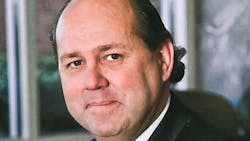Darling International Fuels a Bold Move into Biodiesels
Rendering is an “ancient art,” Darling International Inc. Chairman and CEO Randall Stuewe notes, but in an era increasingly concerned with the cost of energy and more efficient uses of resources, the recycling of animal wastes is proving a surprisingly modern and growth-oriented business.
Darling International (IW 50/13), with sales of $1.8 billion in 2011 and 3,300 employees, operates at more than 130 locations in 42 states. The Irving, Texas, company recycles beef, pork and poultry waste into products such as tallow, feed-grade fats, and meat and bone meal. Darling also collects used cooking oil and wastes from commercial bakeries and converts them into feed and fuel ingredients.
Adjacent to Valero Energy Corp.’s (IW 500/8) St. Charles refinery near Norco, La., Darling and the refiner are building a $425 million plant to take animal fats and convert them into an estimated 136 million gallons of renewable diesel annually. The Diamond Green Diesel joint venture plant is expected to begin operations early next year.
Stuewe said Darling had faced both technology and market hurdles when it began investigating the biodiesel business. At the time, biodiesel made from animal fat worked fine above 50 degrees Fahrenheit, he noted, but in cold temperatures, it basically turned back into a “block of Armour Lard.” Then Darling was contacted by UOP, a division of Honeywell International Inc. (IW 500/37), which offered a hydrotreating process that could take the animal fats and turn them into a hydrocarbon, creating a large portion of renewable diesel and a smaller portion of gases such as naptha and butane.
Stuewe said Darling also needed a partner that could help it enter the fuel market. “The reality is, the market for fuels is a very challenging market because it is controlled by distributors,” he said. “The market is the Exxons, Shells, Chevrons and Valeros that control distribution to the gas stations. It all moves by pipeline. We were about to create a product that didn’t have a market. It would have been a disaster.”
In the spring of 2009, Valero contacted Darling and said it was interested in working with them to expand its alternative energy portfolio. The two companies first sought funding from the Department of Energy to build a plant, but when that proved too encumbered, Valero said it would finance the new refinery project.
The move into fuels not only opens a new market for Darling but also provides the company with a hedge against the feed market. “When we plug Diamond Green Diesel into our business, what we have done is move the business from selling proteins and fats predominantly to the feed market to adding the next ‘f’—the fuel market,” said Stuewe. “The belief I hold is the farmer will continue to produce more and more, become more productive in terms of better yields on corn and soybeans and the value of petroleum will be stable to increasing. There will be a natural arbitrage to choose between selling fats to sprinkle on feeds and shipping for hydrocarbon.”
Great Assets, Great People
Darling has also aggressively expanded its geographic reach recently. In December 2010, the company acquired Griffin Industries, a private rendering firm of roughly the same size with a strong presence in the Midwest and Southeast, for approximately $840 million in cash and stock.
Stuewe says the Griffin acquisition provided Darling with “some great assets but most importantly, some great people.” He recalled that when he had run a previous business, he had made an acquisition and put only his own people into management roles. “They were losing money, we were making money, so that made us smarter,” he said. But what he learned from the experience was that it was important to seek out talent and leaders from both sides to make a merged company operate smoothly. He has employed that philosophy with Griffin, aiming to create a “culture of respect and no surprises” at the combined company.
“The true measure of a successful integration is how many people did you lose along the way,” Stuewe said. “We’ve lost nobody.”
About the Author
Steve Minter
Steve Minter, Executive Editor
Focus: Leadership, Global Economy, Energy
Call: 216-931-9281
Follow on Twitter: @SgMinterIW
An award-winning editor, Executive Editor Steve Minter covers leadership, global economic and trade issues and energy, tackling subject matter ranging from CEO profiles and leadership theories to economic trends and energy policy. As well, he supervises content development for editorial products including the magazine, IndustryWeek.com, research and information products, and conferences.
Before joining the IW staff, Steve was publisher and editorial director of Penton Media’s EHS Today, where he was instrumental in the development of the Champions of Safety and America’s Safest Companies recognition programs.
Steve received his B.A. in English from Oberlin College. He is married and has two adult children.
